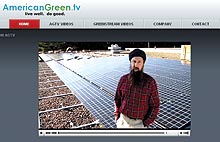Dave Hollister, president of Sundance Power Systems, is no newcomer to environmental issues. A former Greenpeace activist, he’s been in the solar-panel business for about 14 years, and until recently his small-scale company operated out of a converted tobacco barn in Madison County.

The whole concept of going green, notes Hollister, was regarded as a mere fringe fad 14 years ago. These days, however, it’s endorsed by celebrities, oil executives and politicians. “People are finally starting to get it,” says Hollister. “The world we’re creating with the energy sources we have is becoming a miserable world to live in. By making this energy transition, we’ll create a better world than we ever could have imagined.”
Sundance Power is one of three local solar companies featured in AdvantageGreen, a new marketing video created for AdvantageWest, a regional economic-development commission. Just before the AdvantageWest board met on Feb. 21, a press event was held to screen the short promotional film, which was produced by the locally based American Green Media Co. The film features clips of local solar businesses and green builders at work, as well as Asheville City Council member Robin Cape, AdvantageWest CEO Dale Carroll and Michael Shore of Environmental Defense talking about Western North Carolina’s potential to become a leader in the clean-energy sector. The idea is that since the region is already home to green businesses, abandoned factory infrastructure and droves of forward-thinking environmentalists, it’s uniquely positioned to become a hub for sustainable technology. The marketing video “is part of a regionwide effort that ties to our five-year vision plan,” Carroll explains. Among other things, the plan calls for developing an environmentally related business cluster. “A region should play to its strengths,” he says, “and build the cluster based on existing as well as prospective companies.”
Although Carroll wouldn’t get too specific, he did drop a hint that AdvantageWest is already putting the film to use. “We used this video in our board room to present to a major renewable-energy company that had visited our region,” he told Xpress. “The video made a strong impression with the principals of the company. It was the icing on the cake.”
Seated at the head of a conference table, AdvantageWest board Chair Tommy Jenkins, flanked by board members in plush, executive-style office chairs, declared, “Green is the new red, white and blue.” Another way to put it, he added, is that “Green is gold.” But whatever “green” is, it has clearly taken on a different meaning in the business world since the days when hippies in Birkenstocks were the only ones talking it up.
One clip from the video shows Hollister working with Deltec Homes CEO David Hall to install more than 200 solar panels on the roof of the company’s manufacturing facility. Hall, meanwhile, formerly held a management position at the Canton paper mill that has historically drawn environmentalists’ ire. As the film’s producer, Kurt Mann, puts it, the shot is a classic example of “the ties meeting the tie-dyes”—but the overarching goal, everyone seems to agree, is to address critical environmental issues while bolstering the regional economy. And the film’s central message is that the twin ideals of environmental health and economic vitality can both be achieved by following this course.
AdvantageWest isn’t the only one holding to that notion. Russ Yelton, executive director of the Entrepreneurial Ventures and Business Incubation program at A-B Tech’s Candler campus, says the school recently obtained federal funding for an effort to equip workers with the skills needed to work in the green-tech industry. The $354,200 earmark, obtained with the help of Rep. Heath Shuler‘s office, will support a clean energy/green technology incubation program, Yelton explains. A-B Tech will offer seminars, online classes and instructional podcasts tailored to the needs of green businesses. And eventually, the campus may offer degrees in these skill sets. “Our main focus at the end of the day is to create jobs,” says Yelton. “And these are the types of jobs that we want to attract.” Among the criteria for selecting businesses to work with, he explains, is that the jobs created would pay at least $15 an hour.
To view AdvantageGreen, go to www.americangreen.tv





Before you comment
The comments section is here to provide a platform for civil dialogue on the issues we face together as a local community. Xpress is committed to offering this platform for all voices, but when the tone of the discussion gets nasty or strays off topic, we believe many people choose not to participate. Xpress editors are determined to moderate comments to ensure a constructive interchange is maintained. All comments judged not to be in keeping with the spirit of civil discourse will be removed and repeat violators will be banned. See here for our terms of service. Thank you for being part of this effort to promote respectful discussion.